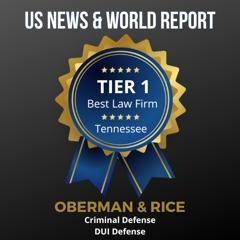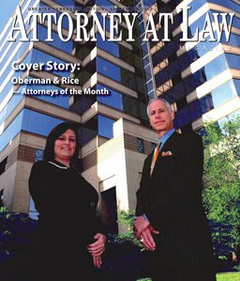Transcript of “Consequences of a TN DUI Conviction – Part 3”
Author: Steven Oberman
Click here to listen to the podcast.
Originally Posted: July 27, 2020
As we discussed in the first two parts of this series on collateral consequences, the repercussions from a DUI conviction extend far beyond the courtroom. Beyond jail, fines, court costs, electronic monitoring devices, probation, and community service, a conviction for Driving Under the Influence impacts a person’s life in many other ways. Such a conviction triggers hidden penalties that surprises our listeners.
Hello, my name is Steve Oberman and today I will continue to discuss the collateral consequences of a DUI. During the first collateral consequences podcast, I outlined how a DUI negatively impacts a person’s auto, health and life insurance benefits, their bankruptcy status, ability to secure a handgun carry permit, and freedom of travel.
In the second collateral consequences podcast, I provided information about the impact of a DUI conviction on parental rights and a non-citizen’s immigration status.
Today I will discuss how a DUI conviction adversely affects professional licenses, and a person’s internet profile.
The risk of a conviction for Driving Under the Influence or as it is sometimes referred to as Driving While Impaired, should be a major concern for any professional confronting this type of criminal charge.
Many business people are often held to a higher ethical standard by the community. However, neither a professional’s education nor standing in the community reduces or eliminates the punishment from a DUI conviction. Instead, these professionals have even more to lose.
Attorneys, teachers, investment advisors, doctors and other health care professionals, among others, must answer questions about their criminal histories when obtaining their certification and licensing. They face the possibility that their professional license to practice will be suspended as the result of a DUI conviction. In Virginia, even a real estate agent lost her real estate license as the result of a multiple offense DUI conviction.
Private and commercial airplane pilots are not exempt either. They may lose their license to fly in addition to losing their license to drive following a DUI conviction. This issue arises even if the pilot was driving their personal vehicle and was off duty at the time.
In summary, any person with a professional license issued by a state or federal government will, at the very least, face increased scrutiny from a licensing agency if they are convicted of a DUI. The prospect of losing a professional license is a serious concern considering the need for these licenses in order to sustain a professional’s livelihood.
Finally, for many, the public shame of a DUI conviction stings the worst.
It is well documented that the internet has become a large storage bin that collects many unwanted memories, mistakes, and youthful indiscretions. The record of a criminal conviction is no different—including information about DUIs. And this storage bin is never emptied. Generally speaking, once on the internet, it remains there—forever.
However, there are some actions you may take to minimize the consequences of internet publicity. It is expensive to manage one’s profile on internet search engines, but the alternative—the possibility that future employers, friends, and romantic partners will discover a conviction, may be far worse. A Tennessee DUI conviction may never be expunged or taken off a person’s record. Because a Tennessee DUI conviction remains in the public record, this conviction will always be found on the internet or in a criminal history check easily obtained from the Tennessee Bureau of Investigation. The lawyers at Oberman & Rice can make some suggestions to assist you to keep this out of the public eye depending on your particular circumstances.
These collateral consequences, and many more, make hiring a lawyer who is certified as a Specialist in DUI Defense Law or focuses their practice in this area of law so important. The lawyers at the firm of Oberman & Rice are available to answer your questions and assist you. Just give a call—after all, Your Future is Our Present Concern.
This is your host, Steve Oberman, and in this episode I will continue to discuss the collateral consequences of a DUI conviction. During the first collateral consequences podcast, I outlined how a DUI negatively impacts a person’s automobile, health and life insurance benefits, their bankruptcy status, their ability to secure a handgun carry permit, and freedom of travel. Today, I will discuss a DUI’s impact on parental rights and a non-citizen’s immigration status.
Let’s start with parental rights.
Children are often the most important part of a person’s life. Unfortunately, when two parents are locked in a battle over child custody, one parent’s DUI conviction can significantly and negatively affect his or her rights.
Courts have gone so far as to deny custody because of a DUI conviction. There are many instances across the United States where a DUI conviction signals to the deciding judge that the parent requesting custody suffers from a substance abuse problem when that is not the case. Even if parental rights are not denied, a DUI conviction will certainly be a negative factor when a judge decides the terms of parental custody.
This is especially true when both parents make strong cases for custody. A judge may review every characteristic of each parent in order to decide how much access parents should be granted to their children. Courts do not look upon any criminal conviction favorably, and a conviction for DUI, will be extremely detrimental.
A DUI conviction also has adverse consequences for anyone who is not yet a naturalized citizen. And, more than one DUI conviction compounds the problem exponentially.
A legal alien’s first offense for DUI is no longer grounds for deportation. It is important to note that this was not always the case. Before 2004, many legal aliens were deported as a result of a DUI conviction and many more were threatened with deportation. Fortunately, in 2004, the United States Supreme Court unanimously decided that a first offense DUI could not be the legal basis for deportation. However, listeners should be aware that in at least one case, a legal alien was deported as the result of a Felony DUI conviction in Alabama.
If the defendant is not a U.S. citizen, it is critical to consult with an experienced immigration lawyer in addition to hiring a skilled DUI defense lawyer. Certain developments or circumstances may unexpectedly make the defendant subject to removal proceedings.
A DUI conviction may also prevent a legal alien from becoming a naturalized citizen. In order to obtain the privilege of naturalization, an applicant affirmatively must establish good moral character. An applicant for U.S. citizenship who has been on probation, parole, or a suspended sentence during all or part of the statutory period is not necessarily precluded from establishing good moral character, but such probation, parole, or suspended sentence may be considered by the U.S. Citizenship and Immigration Services in determining whether the applicant meets the “good moral character” requirement.
Furthermore, during the process to obtain a green card, non-citizens must undergo a medical examination. One or more convictions of an alcohol-related offense may trigger a heightened scrutiny and make it more difficult to obtain citizenship.
Of course, an undocumented alien faces a much greater risk of detention and deportation. Any undocumented alien convicted of a DUI or any other crime, for that matter, may be taken into custody and transported out of the county at any time.
I hope that you enjoyed this podcast and now have a better understanding about more of the collateral consequences, which arise from a DUI conviction. Of course, some details have been excluded due to time limitations, but you may always call the lawyers at the firm of Oberman & Rice to answer your questions and assist you.
We hope you enjoyed listening to the DUI law podcast1 produced by the Oberman and Rice Law Firm. You may read about related legal matter on our websites at https://www.tndui.com and https://www.duiknoxville.com or visit our blog at https://www.tnduicenter.com. You may also speak to one of our lawyers by calling (865) 249-7200. Until next time, remember to drive safely.
Portions of this podcast were taken from Mr. Oberman’s text, DUI: The Crime and Consequences, Published by West/Thomson Reuters, 2011.See https://www.tndui.com/oberman-dui-textbooks.php#tndui
Featured Posts
 June 10, 2025
June 10, 2025
Tennessee License Revocation for Accidents or Points
The Tennessee Driver Improvement Program is a uniform system established to authorize the Tennessee Department of Safety (“TDOS”) to evaluate driver records for those who have been involved in motor vehicle accidents and/or sustained convictions for moving traffic violations. […]
Read More May 19, 2025
May 19, 2025
New DUI Law to Stop the Arrest of Innocent Drivers
Governor Bill Lee has now signed 2025 Senate Bill 1166 into law. It is now designated as 2025 Public Chapter 327. This law originated due to the investigation by WSMV TV (Channel 4) in Nashville, Tennessee. They requested, analyzed and […]
Read More March 25, 2025
March 25, 2025
Tennessee Drivers’ Licenses May Go Electronic
Tennessee Senate Bill 1297 was introduced this year proposing to allow Tennesseans to use Digital Driver’s Licenses (DDLs) as a valid form of identification wherever an ID is legally required, except for voting. The DDLs would allow Tennesseans to download an […]
Read MoreContact
Office
Oberman & Rice
550 Main Street
Suite 730
Knoxville, TN 37902
Phone Number
(865) 249-7200
(865) 540-1696 (fax)
GPS Coordinates
Long: 35.970504
Lat: -83.914776
Useful Links
contact us today for a free consultation
We reply to non-urgent after-hours requests for consultation within 24 hours. For after-hour emergencies, please call us at (865) 249-7200.














